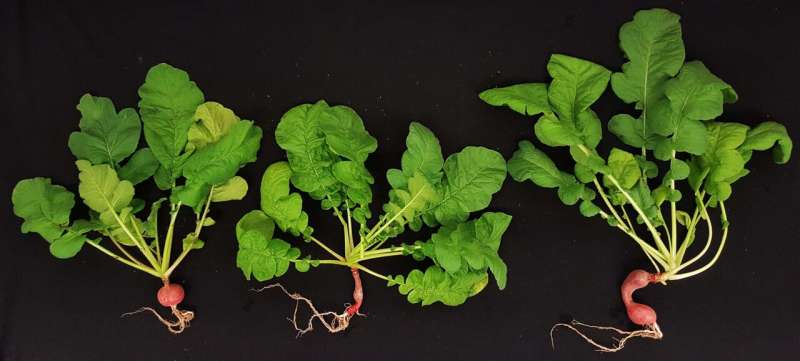August 22, 2022 report
Growing alfalfa in Martian-like soil and filtering water using bacteria and Martian basalt

A team of researchers at Iowa State University has found that it may be possible to grow alfalfa successfully on Mars. The group has written a paper describing their work and have published it on the open-access site PLOS ONE.
As various groups around the world ponder the possibility of not only sending humans to Mars but of building shelters on the Red Planet that could sustain them—possibly indefinitely—work continues on ways to make such projects possible. Such projects have many challenges to overcome before they can become reality, one of which is how to feed people living so far away. One possibility that is getting a lot of study is growing food inside of protected enclosures. Such enclosures would have to mimic conditions here on Earth, of course, since the plants that would be grown there would have to come from here.
Growing plants on Mars will require a few basic elements—soil, water, food and sunlight. In this new effort, the researchers looked at the first two. Mars does not have much to offer in the way of soil, instead it has basalt, a kind of volcanic rock. Basalt has few if any of the ingredients in it that plants could use as food, and it is rocky rather than loamy. Thus, growing food in it would require both altering the basalt and using plants best suited to it use.
In this new effort, the researchers tried growing several types of crop plants in finely ground basalt found on Earth. In so doing, they found that plants such as turnips, lettuce and radishes did not grow well. On the other hand, they found that alfalfa did really well. The researchers also found that if they grew alfalfa in a plot of basalt and then later planted other crops in the same patch of basalt, those crops did much better. Turnip yields increased by 311%, for example.
Next, the researchers turned to water, which is very scarce on Mars. It is mostly found in ice on the poles. The water there is also very salty and thus cannot be used to grow plants. To reduce the saltiness of water samples here on Earth, they added a type of bacteria known as Synechococcus because it can desalinate water. Testing showed it could dramatically reduce salt concentrations but not enough for use on plants. The team then filtered the water sample further by pouring it through piles of basalt rocks—enough, they found, to allow for its use in growing plants.
More information: Pooja Kasiviswanathan et al, Farming on Mars: Treatment of basaltic regolith soil and briny water simulants sustains plant growth, PLOS ONE (2022). DOI: 10.1371/journal.pone.0272209
Journal information: PLoS ONE
© 2022 Science X Network


















